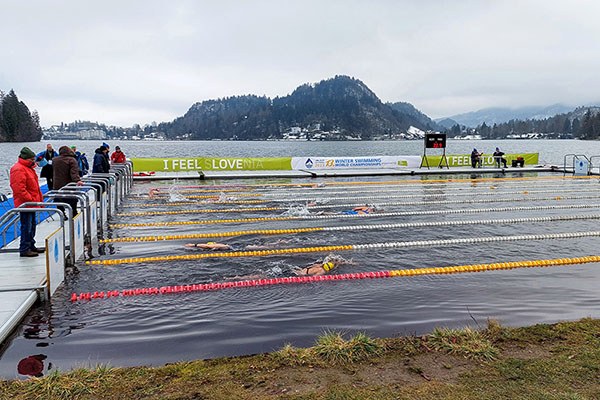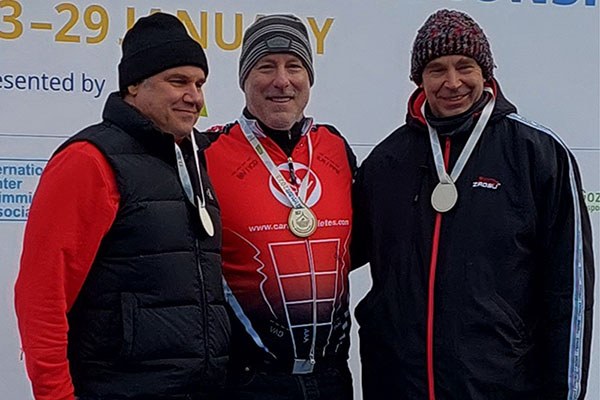
[adinserter block=”2″]
Gold in the 100m breast. The silver and
bronze medalists left before the medal ceremony. I chose to compete
for Estonia just because I have been living here so long.
My friend Jason got me into
powerlifting a year ago, mainly because he got tired of hearing me
complain about my lower back. A 56-year-old American living in
Tallinn, Estonia, I had been trying to compete at masters swimming
fitfully over the previous few years with no success, either for my
spine or my intermittent dreams of late-in-life athletic glory. On
Jason’s advice, I bought the blue book and started my novice linear
progression. A year later, as a masters world champion in winter
swimming, I stand as proof that Starting Strength can super-charge
your athletic performance, even if your sport is unimaginably
unpopular.
When I started my linear progression in
December 2021, I weighed 185 lb (84 kg) at 6’0” tall (183 cm).
With a bit of advice on form from Jason, in my first workouts my
squat started at 82.5 lb (37.5kg)., deadlift 135 lb (60 kg), bench
135 lb (60kg), and press 77 lb (35kg). From there, I started
training on my own, and I made a lot of mistakes. As a high school
swimmer in Texas years ago, my coach had tattooed on my brain that
sets of 12 reps were the way to gain strength, and I kept that up for
way too long. In my squats, I just couldn’t make the movement work.
While still making some progress, I
realized that I needed help. Last summer I signed up for a Starting
Strength squat/deadlift/press camp in Brussels, where the coach was
Steve Ross from Brussels Barbell. Afterwards, Steve agreed to be my
online coach. He dialed back my weights, reset my form, re-started
my linear progression, and then later switched me to intermediate
programming.
Now, Estonia, where I live, is the
northernmost Baltic country, just south across the Baltic Sea from
Finland, with Russia on the eastern border. Sauna culture is big, and
in wintertime people enjoy stepping out of their saunas in the
countryside to take a dip in nearby lakes or rivers – after they
carve a hole out with axes or chainsaws. Winter swimming is
considered good for your health, and, as these things happen, someone
started organizing winter swimming competitions along the way.
Decades ago in Dallas, Texas, I swam
competitively in high school. Since moving to Estonia in 1994, I got
into the sauna culture here. And, as a lark or perhaps mid-life
crisis, I also started competing in winter swimming. Winter swimming
competitions are held in 25m pools constructed in lakes or rivers in
which the water temperature is between 0 C / 32 F and 5 C / 41 F.
Swimmers only wear regular swimsuits – wetsuits or neoprene caps
are not allowed. The longest race is one kilometer, and this usually
takes experienced winter swimmers around 15 minutes (the world record
is near 11 minutes). I might be crazy, but I am not that crazy – I
don’t like racing any distance longer than 100 meters. The cold
does take a toll.
When I started working with Steve, I
let him know that I needed to swim two to three days a week, and that
my goal was to swim fast at the Winter Swimming World Championships
in Slovenia in January 2023. Steve cut me back to two weight workouts
a week, helped me work my recovery around my swimming, and kept my
numbers going up. I got used to being “that guy” with a selfie
stick in the gym so I could upload videos and screenshots of all my
sets for Steve’s review.
Thanks to Steve and Starting Strength,
I am stronger now than I was in high school or college. I now weigh
210 lb (95kg), and my work sets reached the following top weights:
squat 286 lb (130 kg), deadlift 330 lb (150 kg), bench 231 lb (105
kg), press 132 lb (60 kg). The numbers would have been higher, I
think, if I had focused on recovery and had not been swimming so
much, but the results were worth it.

The competition pool in Lake Bled,
Slovenia
In January, the IWSA (International
Winter Swimming Association) hosted their thirteenth world
championships in Lake Bled, Slovenia. Over 500 swimmers from 30-odd
countries made the journey to compete. The organizers built a 10-lane
25m pool by the shore, right next to Slovenia’s Olympic Rowing
Center, where the water was 5.5 C / 42 F. Given the cold, in winter
swimming, for safety reasons, all swims are from a push off the wall,
all turns are open, and you can’t streamline more than 5m off the
walls.
What is it like as an old fart in these
competitions? Well, as an ex-swimmer, I can tell you that your
emotions are exactly the same as when you were twelve years old at a
summer club meet: You go to the ready room, and the nervous energy
before you get led to your heat is exactly the same. But the social
aspect is much better – I know a lot of people from winter swimming
events over the years, and there is a lot of cheering for your
friends from other countries. (The wine and beer in the evening are
much better, too.)
In my age group of 55-59-year-old men,
I won three events. In the 100m breaststroke, I broke the existing
age group world record by four seconds. In the 25m butterfly – a
pure power event – I even qualified for the “super final,”
where the top eight finishers regardless of age group got the chance
to race for the overall gold. One of the competitors was 36 years
younger than me. Thanks to the shoulders and chest I built up in
lifting, I came in fifth place in the world at 56 years old.

Gold in the 50m free, next to Gerrit
Curcio of Italy (silver) and Andreas Stanzl of Germany (bronze).
Gerrit later smoked me in the 25m free.
Granted, racing in ice water in winter
is not as competitive as events in pools in the summer. There are
thousands and thousands of pool swimmers faster than me. But
sometimes success in life is about showing up, and about being
willing to do hard things. (You can compare the feeling before a
deadlift work set to the feeling at the top of a ladder when you are
about to step down into the ice.) No matter what, I can now call
myself a world champion.

Relay gold. My Estonian friends and I
won a 4x25m breast relay for age group 151-200 (sum of the ages of
all four swimmers).
And I know that I would not have gotten
on top of that podium if it had not been for the gains in strength
that Starting Strength gave me over the last year. Looking forward, I
do not know how long I will be able to compete in winter swimming at
this level. But the swimmers in their 80s and 90s at the
championships really inspired me. In Estonia, I have found both my
home and my sports, and I will keep swimming and lifting for as long
as I can.
Discuss in Forums
[adinserter block=”2″]
Credit : Source Post






